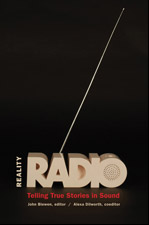 The publshers of Reality Radio have allowed to post a bit of their book. From John Biewen’s Introduction:
The publshers of Reality Radio have allowed to post a bit of their book. From John Biewen’s Introduction:
The goal is to bring together producers with distinctive, powerful, and richly varied approaches to their craft. Some of our essayists call themselves audio artists. They push the boundaries of journalism to the breaking point—okay, beyond the breaking point—in the service of an aesthetic vision but also in pursuit of a different (higher?) sort of truth. Others describe themselves primarily as storytellers, drawing mainly on the narrative power of the spoken word. Still others see themselves as journalists; on the surface, at least, they emphasize information over formal innovation. But the journalistic documentarians, too, give careful attention to form and, in fact, employ plenty of (conventionally sanctioned) artifice along the way.
Here’s an excerpt of the essay “Coming Home,†by Katie Davis:
A boy rumbles by on his skateboard, says his name is Julio and asks to pet the dogs. Sure. Another twelve-year-old bellows like a carnival hawker, “Hey lady, you got a tire patch?†Sure. And I give Joaquin ten dollars to run to the bike store to buy three patch kits, one for him, and the rest I’ll keep for other kids. The super from the building down the street notices the cluster of kids and lugs up two old bikes he found in the alley. And this is how, without planning, I start a recycle-a-bicycle program on my front porch. Everything takes place on my front porch for a long while.
I become known as the “bike lady,†the lady who always has granola bars and time to sit and listen. After a year, I form a youth group called the Urban Rangers and begin raising money to pay for bike parts and snacks. Two teenagers ask me start a basketball team. Sure why not? And then as I explain my philosophy to the guys, that winning is not important on this team, and everybody will get to play in every game. “No, no,†the boys interrupt and begin coaching me on how to be a coach. The dialogue is funny and that night the rusty part of my radio brain begins chanting, Good tape. Good tape.
So, I call an old friend at NPR and float the idea of writing an “essay with tape†about my team. I warn the show producer that the story will be personal, like a diary, that I break the rules of journalism in every paragraph. I write in the first person and I have not kept any objective distance from these boys. I give money to two brothers because I know they are hungry. I hire another kid’s father because they are struggling on $12,000 a year. The boys hang out at my house, they come to tell me about problems. I no longer wanted any distance between me and these neighborhood kids. NPR solves the issue of my status by calling me a commentator. My transition from reporter to commentator took four years of neighborhood porch sitting and trouble shooting and is distilled into this one word.
From Reality Radio: Telling True Stories in Sound, edited by John Biewen.
© 2010 by the Center for Documentary Studies.
Used by permission of the University of North Carolina Press.
Ka